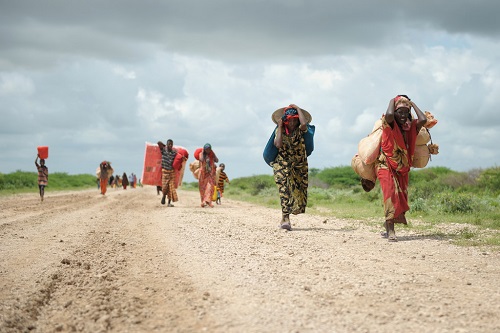Tobin Jones/UN photo
By
Tom Arms
Every now and then you have to blow your own horn. This is one of those occasions when I am going to do just that.
Last week I won a commendation from the award committee of Britain’s Ashdown Prize for Radical Thought. It would have been nice to win first prize and the cash that went with it, but the commendation provides me with a modicum of credibility and the hook to promote it.
The commendation was for my proposal for “Development Bonds.” What, you may ask are Development Bonds? Well, I think they are a multi-level win/win solution for a transfer of capital from the developed to the developing world.
It works like this: Developing World governments propose projects for consideration. Developed World governments approve or disapprove the projects using an agreed criteria. Financial institutions raise the capital through bond issues. Developed countries encourage investment in the bonds by offering taxpayers relief on the repayments.
The template for the development bonds are America’s municipal bonds. Contrary to public opinion, municipal bonds did not originate in the US. They were common during the Renaissance when the Italian city states regularly used them to raise money for public building projects. But they came of age in the US in 1812 with a New York City bond issue to build the 327-mile Erie Canal which linked the nascent potential of the American West to the port of New York and through it the markets of the world.
Thousands of cities and local authorities around the globe raise money through bond issues. But America’s municipal bonds stand out by offering income tax relief on the repayments. This means that they attract not only institutional investors but also high-wealth private individuals. American municipal bonds are one of the chief financial instruments that have transformed the United States from a resource-rich, backward, often corrupt, virgin territory—not unlike Sub-Saharan Africa today—into the world’s only super power.
Development Bonds would achieve the following:
- A substantial increase of capital funding available to developing countries for development projects, complementing existing sources of finance.
- It would place the initiating and implementation process in the hands of the Developing World while still allowing a substantial input by Developed World countries.
- Give the Developed World’s general public a direct stake in the success of the Developing World.
- Shift a significant share of the burden of development from taxpayers to private investors and thus help to remove the issue of aid from the domestic political agendas of the Developed countries.
However, some development economists who have considered the idea have thrown up some reservations. That is their job. They have pointed out that investors will seek guarantees. That there is a problem with increasing the indebtedness of already overburdened developing economies and that the mechanisms required may fall foul of existing regulations such as the mixed credit rules of the OECD’s Development Assistance Committee
Those are details. They are important details. But if the principle is accepted then the will is created to deal with the details.
Acceptance must come from the political establishment which is why I was particularly pleased that the commendation was awarded by Liberal Britain at the recent Liberal Democrats Party’s annual conference. Political acceptance is vital because the Development Bond proposal requires a national treasury to agree a drop in tax revenues. I stress, this reduction would be more than offset by a cut in direct aid. One official at the British Department for International Development said that private investment of this kind is worth ten times direct government aid.
Ideally, this is a group wide initiative for the G8 countries. But given the difficulty of achieving committee consensus, it might be best if the plan is tested by one or two major donor countries. If it works then they can sponsor a roll out to any other G8 countries that want to participate.
Finally, thanks very much to Lord Ashdown, the Ashdown Prize Committee, Liberal Britain and the Liberal Democratic Party for providing me with the platform from which I could blow the development bond horn.
Tom Arms
I am a journalist, entrepreneur and historian with extensive experience in print, web and broadcast journalism. I started as a diplomatic correspondent, wrote several books (The Falklands Crisis, World Elections On File and the Encyclopedia of the Cold War), and then in 1987 started my own business (Future Events News Service, www.fensinformation.com) which over 25 years established itself as the world and UK media’s diary. Our strapline was: “We set the world’s news agenda.” I sold FENS in December 2012 but retained the exclusive broadcast rights to all of FENS data. To exploit these rights I set up LookAhead TV which produces unique programmes which “Broadcasts Tomorrow Today” so that viewers can “Plan to Participate.” LookAhead has appeared regularly on Vox Africa, Radio Tatras International, The Conversation and Voice of Africa Radio.
In addition to being a syndicated broadcaster and columnist on global affairs, Tom is also available for speaking engagements and can be contacted on Twitter, Linkedin and email: [email protected].



No Comments Yet!
You can be first to comment this post!